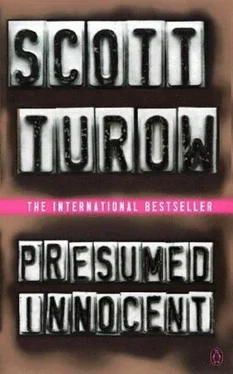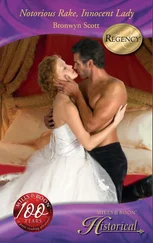Scott Turow - Presumed innocent
Здесь есть возможность читать онлайн «Scott Turow - Presumed innocent» весь текст электронной книги совершенно бесплатно (целиком полную версию без сокращений). В некоторых случаях можно слушать аудио, скачать через торрент в формате fb2 и присутствует краткое содержание. Жанр: Детектив, на английском языке. Описание произведения, (предисловие) а так же отзывы посетителей доступны на портале библиотеки ЛибКат.
- Название:Presumed innocent
- Автор:
- Жанр:
- Год:неизвестен
- ISBN:нет данных
- Рейтинг книги:4 / 5. Голосов: 1
-
Избранное:Добавить в избранное
- Отзывы:
-
Ваша оценка:
- 80
- 1
- 2
- 3
- 4
- 5
Presumed innocent: краткое содержание, описание и аннотация
Предлагаем к чтению аннотацию, описание, краткое содержание или предисловие (зависит от того, что написал сам автор книги «Presumed innocent»). Если вы не нашли необходимую информацию о книге — напишите в комментариях, мы постараемся отыскать её.
Presumed innocent — читать онлайн бесплатно полную книгу (весь текст) целиком
Ниже представлен текст книги, разбитый по страницам. Система сохранения места последней прочитанной страницы, позволяет с удобством читать онлайн бесплатно книгу «Presumed innocent», без необходимости каждый раз заново искать на чём Вы остановились. Поставьте закладку, и сможете в любой момент перейти на страницу, на которой закончили чтение.
Интервал:
Закладка:
"And I told them that you didn't say anything about that."
I look at the boy.
"Okay?" he asks.
I am, of course, supposed to remind him to tell the truth.
"Sure," I say again.
"I don't think you're the guy who killed her."
"I appreciate that."
"It's like karma," he says. "It isn't right."
I smile. I lift my hand to direct him to the landing, and just like that it hits me. It's like running into a wall, the recognition and the panic. I am so frightened that my legs begin to give out, actually buckle, and I reach for the railing. You fool, I think, you fool. He's wired. He is wearing a tape recorder. Nico and Molto wired him up. That is what he's doing here, that's why he does riot seem right. He isn't. He follows us into the apartment and watches everything we do, then gets me out here to suborn him. And I've just convicted myself. I'm gone. I feel that I am going to faint. I falter again, but this time I turn backward.
Marty extends his hand. "What is it?"
When I look at him I know I'm crazy. Absurd. He is dressed for the season, a tight T-shirt and shorts. Not even a belt. Nobody can hide equipment under that. I watched Glendenning frisk him. And it's not there in his eyes either. All I see is this spaced-out kid, kindly, timid, terribly lost. I have suddenly sweated through my shirt. I am wrung out now and weak. My pulse is beating far up in my arms.
"I'm okay," I tell him, but Marty takes my elbow anyway as we start down the stairs. "It's the place," I say. "It does bad things to me."
Chapter 25
Three a.m. When I awake my heart is racing and cool traces of sweat are abrading my neck, so that in the idiocy of sleep I am trying to loosen my collar. I grope; then lie back. My breath is short, and my heartbeat thunders intermittently in the ear against the pillow. My dream is still clear to me: my mother's face in agony; that worn cadaverous image as she neared the end, and worse, her look of lost, unspeaking terror.
When my mother became sick, and quickly died, she was in the most peaceful period of her adult life. She and my father were no longer living together, although they still worked side by side each day in the bakery. He had moved in with a widow, Mrs. Bova, whose urgent bearing when she came into the shop I can remember even from the years before her husband died. For my mother, whose life with my father had been a dominion of fear, this arrangement became a kind of liberation. Her interest in the world outside her suddenly increased. She became one of the first of the regular callers on those listener-participation talk shows. Tell us what you think about interracial dating, legalizing marijuana, who killed Kennedy. She stacked the dining-room table with old newspapers and magazines, pads and index cards on which she made notations to herself, preparing for tomorrow's programs. My mother, who was phobic about venturing beyond our apartment building or the shop, who had to begin her preparations early in the morning if she was going to depart her home sometime that afternoon, who from the time I was eight sent me to the market so that she could avoid leaving the house-my mother became a local personality of sorts for her outspoken views about various worldly controversies. I could not reconcile this development with the accommodations I had made long before with myself to accept her wildly verging eccentricities, or the narrow margins of her former life.
She had been twenty-eight, four years my father's senior, when they were married, the sixth daughter of a Jewish union organizer and a lass from Cork. My father wed, I'm sure, for her savings, which allowed him to open up the shop. Nor was there ever any sign that my mother had married for love. She was an old maid and, I would guess, far too peculiar to gather other suitors. Her behavior, as I witnessed it, was apt to be excessive and ungovernable, with manic tours from pinnacles of rosy hilarity to hours of brooding looks. Sometimes she became frantic. She was forever running to ransack her crowded dresser drawers, rummaging in her sewing box as she made high-pitched excited noises. Because she seldom left home, her sisters made it a habit to look after her. This was a brave endeavor. When my aunts visited, my father would assail them in loud conversation with himself as busybodies, and he was not above actual threats of violence if they came when he was drunk. The two who ventured most often, my Aunts Flo and Sarah, were both bold, determined women, their father's daughters, and they were apt to control my father with stern looks and fearless demean or, not much different than if they were confronting some barking cur. They were undeterred in their unannounced mission to protect the meek-Rosie (my mother) and, especially, me. For me these sisters were a hovering presence throughout my childhood. They brought me candies; they took me for haircuts and bought my clothes. They supervised my upbringing in such routine fashion that I was in my twenties before I recognized their intentions-or their kindness. And somehow, without ever realizing it had happened, I grew to know there were two worlds, my mother's and the other one dwelled in by her sisters, the one to which I eventually recognized I, as well, belonged. It was a fixed star of my youth to think that my mother was not, as I put it to myself, regular; to know that my adoration of her was a purely private matter, unintelligible to others and beyond my power to explain.
Do I really care what she would think now? I suppose. What child would not? I am almost glad she did not live to witness this. In her last few months she was with us. We were still living in the city in a one-bedroom apartment, but Barbara refused to see my mother anywhere else. She slept on a daybed in the living room from which she seldom rose. Barbara, most of the time, sat on a hard wooden chair drawn close. Near the end, my mother spoke constantly to Barbara. Her head was laid on her pillow, her face sadly reduced by disease, her eyes narrowly focused, their light growing weak. Barbara held her hand. They murmured. I could not make out the words-but the sound was constant, like a running tap. Barbara Bernstein, daughter of a sleek suburban matron, and my mother, of roaming mind and indelibly sweet disposition, voyaged to one another, crossed the straits of loneliness, while I, as ever, was too full of private grief to make my own approach. I watched them from the door: for Barbara, the mother who made no demands; for Rosie, a child who would not disregard her. When I took Barbara's place, my mother held my hand. I had the decency to tell her often that I loved her; she smiled weakly, but seldom spoke. Near the end, it was Barbara who gave her the shots of Demerol. A few of the syringes are still downstairs in a box of odd keepsakes of my mother that Barbara maintains: antique bobbins and index cards; the gold-tipped Parker pen she used to make notes for her radio appearances.
I walk through the dark to find my slippers, slide my robe from the closet. In the living room, I sit, feet up, huddled in a rocking chair. Lately I have been thinking of taking up cigarettes again. I feel no cravings, but it would give me something to do in these abject hours in the dead of night when I am now so often awake.
A game I play with myself is called What Is the Worst Part? So many things seem trivial. I do not care much now about the way the women gape at me when I walk around in the village center. I do not worry about my reputation, or the fact that for the rest of my life, even if charges are dropped tomorrow, many people will cringe reflexively whenever they hear my name. I do not worry about how hard it will be for me to find work as an attorney if I am acquitted. But the steady emotional erosion, the sleeplessness, the manic anxiety I cannot pretend about or minimize. What is worst are these midnight wakings and the instants before I can gather myself, when I am sure that the terror is never going to end. It is like groping for the switch plate in the dark, but I am never certain-and here the terror is the worst-I am never sure that I will find it. As the search becomes more and more prolonged, the little bit of sense that holds forth in me erodes, gives way, bubbles off like a tablet dropped into water, and the wild blackness of some limitless and everlasting panic begins to swallow me.
Читать дальшеИнтервал:
Закладка:
Похожие книги на «Presumed innocent»
Представляем Вашему вниманию похожие книги на «Presumed innocent» списком для выбора. Мы отобрали схожую по названию и смыслу литературу в надежде предоставить читателям больше вариантов отыскать новые, интересные, ещё непрочитанные произведения.
Обсуждение, отзывы о книге «Presumed innocent» и просто собственные мнения читателей. Оставьте ваши комментарии, напишите, что Вы думаете о произведении, его смысле или главных героях. Укажите что конкретно понравилось, а что нет, и почему Вы так считаете.












